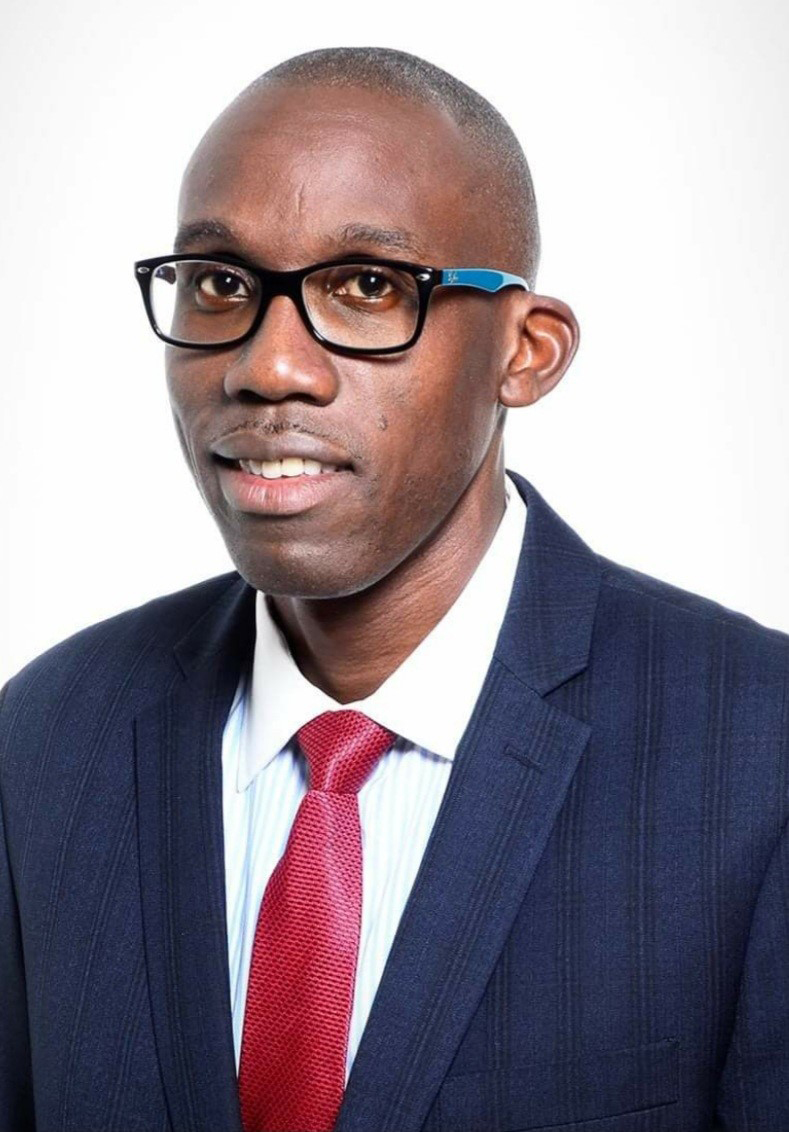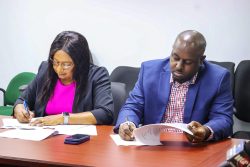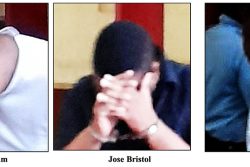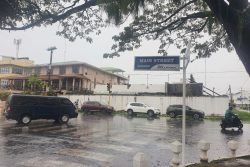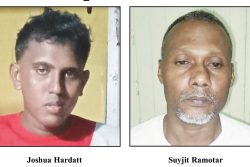International civil servant Dr Toussant Boyce, 48, has described as “ridiculous,” his achievements which include two master’s degrees with first class honours from Cambridge and Harvard and offers of scholarships from both to read for doctorates in philosophy, a first for a Caribbean national. He can place some 11 acronyms after his name, but not a man to show off, he uses none.
Boyce, the first Head, Office of Integrity, Compliance and Accountability, Caribbean Development Bank (CDB) has always been either the first or among the first in the Caribbean to do certain things.
“I always ask, why me?” he said in an interview with Stabroek Weekend from his Barbados home.
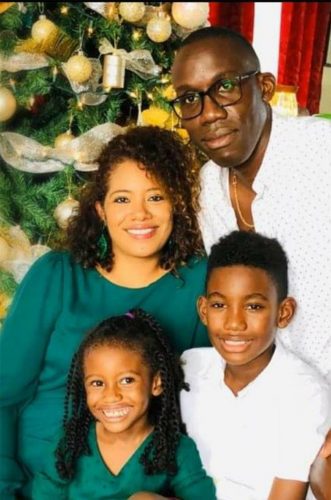
Ramsammy-Boyce and their two children
His life’s goals are, “love of God, love of family, love of community, love of country and love of company, in that order.”
He previously worked in-house as the first general counsel for Republic Bank in Guyana, then as a finance attorney in New York, and as a special counsel to the financial regulator at the Central Bank of Trinidad and Tobago.
“All those roles are completely different but connected and unique. I’ve been blessed to do things that if you had told me years ago were possible, I would have doubted,” he said.
Boyce was among the first batch of students to enter President’s College (PC) in 1985, in the first graduating batch of law students from the University of Guyana (UG) and in the first batch from UG to graduate from Hugh Wooding Law School (HWLS) in Trinidad.
He obtained a PhD in international financial law and regulation from Cambridge University as a Cambridge International Scholar in three years out of a six-year period given to secure it.
The savant from Beterverwagting, East Coast Demerara was raised by his mother who worked at a garment factory and struggled to raise seven children. He is the fourth child of Lynette Boyce-Bowman and Winston Boyce, an academic who divorced his wife while studying animal husbandry overseas.
“My earliest memory was going into my father’s chest of books at five or six years and reading a lot of everything which helped to develop a lot of my literary skills,” Boyce said. “We grew up poor in the context of the village and on the generosity of others. My earliest experiences and strongest memories are of BV. On my way to school, Teacher Esther (Utoh), whose house I had to pass, would ask how I was and give me something to eat.
“I was saved a lot from poverty because I went off to President’s College after topping my school, Quamina Primary, at the common entrance examinations in 1985. When I entered PC my mother took off the wheels of my brother’s roller skates shoes which had some holes in the soles because she couldn’t afford to buy me a pair of shoes. I couldn’t walk in water because it soaked my socks. When I went home on holidays it was fetching water, scrubbing the floor, sweeping the yard and having to deal with hardships like hunger.
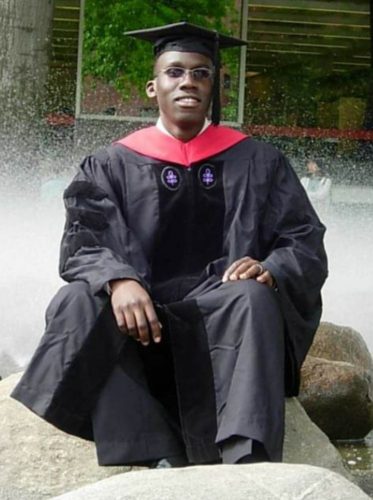
“As a young child I had a high level of intellectual curiosity, always involved in the arts and sports balancing that with the academics. I was full of energy and was described as ‘fronting’. No speech would be delivered at PC without me asking questions. PC opened a whole new world to me and in a sense saved me because it enabled me to be the best youth I could be at that age.”
School song
One of his signature contributions to PC was winning the competition for the school song at 13 years old. “Onward Marching Future Leaders” was written to the tune of “Onward Christian Soldiers” and as a charge. Boyce thinks he wrote it because his experience at PC knew no race or racism in the context of racial discrimination. “We lived with a level of camaraderie, trust and fellowship that was unlike anything I had ever experienced before. Words like ‘unity’, ‘nation building and ‘moving forward’ meant something. Understanding the place of God in my life all fed into the school song. Even at 13 years, I was beginning to interpret and express some of what I felt and what my assignment in life would be,” he said.
People misinterpreted the school’s vision ‘elite of service’ to mean students were going to be elitist and brainwashed politically, he said. “At PC we didn’t even see ourselves in that way. We expressed ourselves in academics, sports, in everything in a way that exuded excellence. We stumbled, made mistakes but we got up,” he added.
At the General Certificate of Education Advanced Level examinations, Boyce said, his academics skyrocketed. “I was the first student in 15 years to pass literature with a distinction at A-levels,” he noted. He credited his teachers, especially Gordon French Snr and Franklin Langhorne who helped him to become a critical, analytical and independent thinker and how to articulate himself.
University of Guyana
Boyce recalled being in the line at UG to register for either geography or economics based on scholarships. He was never a Guyana government scholar. His friends who were registering for law advised him to do the same. While at PC, he had said in a Stabroek News interview that he wanted to be a corporate lawyer and he saw this as an opportunity. A girl in the line asked him if he had $20 million to complete the law programme in Barbados. At that time, only the first year was done in Guyana and then students moved to Barbados. Not having the money, he stepped out of the line. “Something literally put me back in, which for me was divine intervention,” he said.
At UG, Boyce said, he had two pairs of pants, a pair of shoes and two shirts. When it rained his socks were soaked, just like when he started PC. Bus fare to return home was another issue. Some days he had no lunch but hung out with his friends pretending he had.
“I like to say that if I keep all of this quiet and don’t share with anyone else for fear of being ridiculed or ashamed of where I came from, no one else would be inspired,” he said
At the end of his first year, he won a scholarship as the top student to go to Barbados. When he went to the Public Service Ministry to claim the scholarship, he was told it had been removed from the budget. He remembered the $20 million.
“I said by God’s grace this is going to work out because I have faith and confidence,” he recalled.
The $20-million problem was overcome by Dr Mark Kirton and PC’s former principal Oswald Kendall meeting with officials of the National Bank of Industry and Commerce (NBIC) which was looking for someone to start its legal department and Boyce was seen as a candidate. “That is how Republic Bank, which bought out NBIC’s assets, paid for my final year at UG and for my two years at HWLS,” he related. He jointly shared the prize for trial advocacy and graduated with first class honours.
Boyce and other UG law graduates entered HWLS several weeks late because UG’s degree was not seen as equivalent to UWI’s.
UG was a tough place, he said. “We packed 90 credits in 30 courses. I was the only student in my batch to gain a distinction. I am saying this to demonstrate how hard it was given the type of environment we were being schooled and graded in,” he added.
Boyce received the Vice Chancellor’s Medal in the first year, the Anne Blue Scholarship in the second year and the Pro Chancellor’s Gold Medal for the third year “which is just ridiculous to think about,” he said.
He has written a note to support Guyana’s application for a law school on the request of the law department.
Republic Bank/public service
On finishing HWLS in 1997, Boyce worked with NBIC/Republic Bank becoming the bank’s first general counsel/manager, legal services. He was not yet 22 years old. “Ordinarily that position goes to someone who is usually very experienced in law,” he noted.
When Republic Bank acquired NBIC to become the largest bank in Guyana by assets, Boyce was there for the opening of the bids. “Me, Nigel Baptiste, Yolanda Foo and John Alves managed that process,” he recalled.
As a young lawyer in Guyana, Boyce used his newly acquired legal skills to take part in drafting the first low income mortgage agreement and he made the case and did the first study for the commercial court in Guyana.
Alongside his paid work, he taught voluntarily for a year at Queen’s College and tutored for three years at UG during his spare time.
A keen footballer, Boyce assisted voluntarily in coaching the Campton Football Club team that won the first Banks Beer football tournament, which replaced the Kashif and Shanghai tournament.
He was a board member of Youth Challenge Guyana and was its chairman for a while during which time he was given an award from the British High Commission for supporting youth initiatives, working with youth on empowerment and mentoring.
Cambridge and Harvard
While at Republic Bank, Boyce was awarded a Chevening scholarship to do a Masters of Law (LLM) in commercial law at Cambridge University in the UK.
At Cambridge in 2003, a girl from the Caribbean who had done her undergraduate degree at Cambridge asked him where he had done his. Told the University of Guyana, she said she had never heard of it. “When the results came out, I was one of the few people to get a first class honours,” he said. “Out of my class of 180, I was the only one to graduate with a ‘starred first’ (first class of a first class) which enabled me to get the foundation scholarship to the senate of the university, a first for a Caribbean student. I was the best graduating student for Queen’s College and also got the Cambridge International Scholarship (CIS) to return for my PhD. Most importantly they got the shock of their lives that this guy had done what was impossible coming from a no-name university. I think I was the first Caribbean person to get a CIS.”
Later, while they were at a museum to meet Prince Charles (now King Charles III), the administrator of the scholarship programme told Boyce that his scholarship was granted on the basis of academic performance and he was the first law student to ever win a CIS.
On completion of his master’s degree he was seconded to Republic Bank (TT) as manager, corporate finance and was part of the team responsible for how Republic Bank would grow across the Caribbean.
While at Republic Bank in Trinidad, Boyce completed a post-graduate diploma in corporate finance at Oxford University, then won a scholarship from Harvard University to join its LLM programme on international finance. At Harvard, he joined the finance concentration programme.
“To get into the finance concentration programme of all the LLM students who applied, probably one percent or even less get into it,” he said.
As a creative original thinker, Boyce said, his dissertation at Harvard which won the prize for best thesis in his programme, “was really a simple description solution for a complex problem. People were trying to figure out why America was losing its influence in the public capital markets. I simply said it was ‘conscious competitive complacency’ and explained why.”
With a choice between Harvard and Cambridge to read for a PhD, Boyce chose Cambridge because it offered him an environment to study and work as a family person.
“I married my wife, Guyanese Kamini Ramsammy, while in Trinidad and just before going to study at Harvard,” he said.
Boyce has two children, one was born in Trinidad and the other in Barbados.
While at Harvard and in New York, he worked with Freshfields Bruckhaus Deringer, one of the top five firms globally recognised as part of the Magic Circle, as a finance attorney on corporate finance and infrastructure finance matters. In New York he supported and mentored youth in university.
After almost four years in the US, Boyce left in January 2010 to join the Central Bank of Trinidad and Tobago to assist with the CL Financial debacle. By then, he had twice deferred the scholarship Cambridge University had offered him to do his PhD.
When Boyce finally left for Cambridge, returning to the Caribbean was not in his immediate plans. He had already accepted a position to move between Switzerland and the US over six-month periods, once he had obtained his doctorate. An accident changed this.
One Sunday afternoon in April, after a football final match in which he scored for Cambridge University, he was riding home when his bike hit the curb, his head hit a clay brick wall and his back hit a pole. He was taken to the university’s hospital where he was immobilised, except for his fingers, for two and a half hours.
“On that hospital bed I said, ‘Lord, if I make it out of here, I want to return home, anywhere in the Caribbean, with my family to give back. I want to do work that would have the maximum possible impact especially in an area of poverty alleviation. I want to do a lot of charitable work. I want to inspire and empower young people. The fifth I keep to myself,” he said. He finished his PhD in June that same year, in three years instead of six.
His doctoral thesis, “The Automaticity and Dynamic Financial Regulations”, another first, looked at automaticity and auto regulations, concepts no one had ever studied before, he said. “It focuses on how to leverage automatic tools to help troubled banks and financial institutions from exploding and delivering outcomes that would destroy entire financial systems and affect countries like the last financial crisis,” he said. “Instead the banks would implode, have their losses absorbed so they would not have to be bailed out. At that time people were thinking about how to get public bailouts done better.”
Boyce said he learned from the CL Financial crisis where he worked alongside or led some aspects of the work to figure out why and how CL Financial had collapsed.
Along his academic journey, Boyce took other programmes. He obtained a diploma with distinction from the Stonier School of Banking, Georgetown University, done with the American Bankers Association. “That programme is done over three years but I did it, accelerated, in two years,” he said.
His academic pursuits, he said, could not have been achieved without the sacrifices of family members who provided support and anchor. “I learnt a lot from my eldest brother after what he went through having to be the man of the house,” he said.
Back in the Caribbean, Boyce was appointed advisor to the CDB vice president. After two years, the office he now heads, was created in 2016 to focus on poverty alleviation. It was the first time in the Caribbean an international financial institution established an office that focused on ensuring every dollar of development funding provided went to the beneficiaries.
He has worked collaboratively with the Federal Bureau of Investigation and the World Bank on the Caribbean Conference on Corruption, Compliance and Cybercrime over the last three years.
His office is independent and Boyce reports functionally to the board of directors and administratively to the board’s president.
What next? “Everything I have done has been about keeping a focus on returning home to Guyana, to deliver and replicate the skills, academic acumen and insights I have acquired,” he said.
